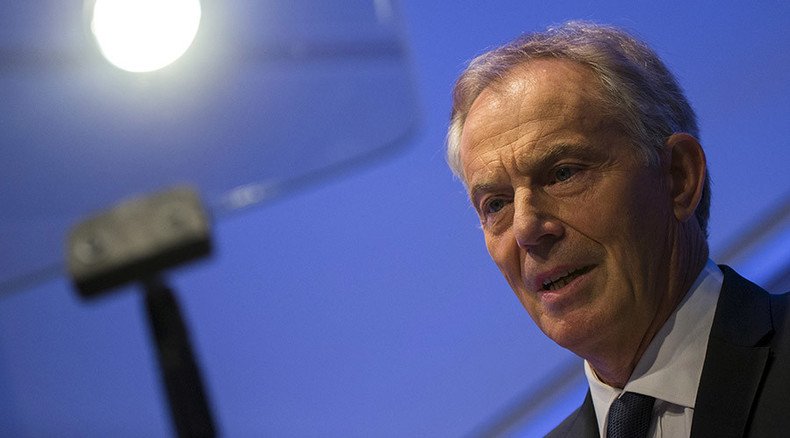Blair acknowledges ISIS stemmed from Iraq invasion, refuses to apologize for toppling Saddam

The former British Prime Minister Tony Blair has acknowledged there are “elements of truth” in statements saying the rise of Islamic State was a direct consequence of the US-led invasion of Iraq, but refused to apologize for attacking the country.
"I find it hard to apologize for removing Saddam. I think, even from today in 2015, it is better that he's not there than that he is there," Blair told CNN’s Fareed Zakaria. The full interview is to be aired later on Sunday.
Saddam Hussein was a dictatorial ruler of Iraq, who had dragged the country into wars with neighboring Iran and Kuwait and used chemical weapons to quash down the rebellious Kurdish minority.
The US and the UK banded together to invade Iraq in 2003 and oust Hussein from power. The move, which was never authorized by the UN and objected to by many countries, was justified by a claim that Iraq had a clandestine program to make weapons of mass destruction. The claim was later proven to be false and trumpeted up by officials in Washington and London to make the case for war. Blair said he apologized for it.
"I can say that I apologize for the fact that the intelligence we received was wrong because, even though he had used chemical weapons extensively against his own people, against others, the program in the form that we thought it was did not exist in the way that we thought," he said.
'Blair’s role in destroying Iraq will follow him to his grave' - @JohnWight1https://t.co/hXpiHMFuNUpic.twitter.com/R6QoBCVdK3
— RT (@RT_com) October 20, 2015The invasion led to a decade of sectarian violence, the rise of various radical groups and the loss of large territories to Islamic State (IS, formerly ISIS/ISIL) last year. Over 4,000 American and 179 British occupational troops were killed and billions of dollars of reconstruction money were wasted due to corruption and negligence.
“I also apologize for some of the mistakes in planning and, certainly, our mistake in our understanding of what would happen once you removed the regime,” Blair said, acknowledging that there were “elements of truth” in the words of those who say that the rise of IS can be traced back to the 2003 invasion.
"Of course, you can't say that those of us who removed Saddam in 2003 bear no responsibility for the situation in 2015," he said. "But it's important also to realize, one, that the Arab Spring which began in 2011 would also have had its impact on Iraq today, and two, ISIS actually came to prominence from a base in Syria and not in Iraq."
IS established a powerbase in Syria, which allowed it to conduct its blitz offensive last year, after three years of violence in the country, where the government in Damascus fought against an increasingly radicalized and foreigner-dominated ragtag force of rebels, bandits and radical Islamists.
The government’s failure to defeat those groups was partially due to the large-scale support of its enemies by countries like Turkey, Saudi Arabia and Qatar. Pressure from Washington and Brussels, which want Syrian President Bashar Assad to be toppled, played its part as well.
Revealed: The #CIA report used as pretext for #Iraq invasion http://t.co/mEbs0fp7j2pic.twitter.com/qxXMm2h2kq
— RT (@RT_com) March 20, 2015According to Blair, western powers tried three different approaches to regime change in Iraq, Syria and Libya.
"We have tried intervention and putting down troops in Iraq; we've tried intervention without putting in troops in Libya; and we've tried no intervention at all but demanding regime change in Syria. It's not clear to me that, even if our policy did not work, subsequent policies have worked better," he said.
In Libya, the US and later NATO, under a UN mandate to protect the civilian population from government airstrikes, destroyed Muammar Gaddafi’s army with airstrikes, helping rebel forces to take over the country. Currently it is a county divided between two rival governments, suffering from instability and a crippled economy.
LISTEN MORE:












